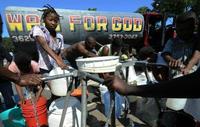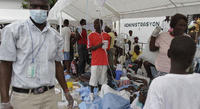-
Cholera spreads to Haiti capital
The cholera epidemic has killed 583 people so far; 9,000 people are being treated for symptoms of the disease; the disease has now reached the capital, and health authorities say the spread in Port-au-Prince likely to be extensive; the Pan American Health Organization (PAHO) says it expects tens of thousands more Haitians to catch cholera in the next few years; eradication will take time, as cholera bacteria now has foothold in the river system
-
-
Cholera threatens to engulf Haiti

The cholera epidemic continues to spread unabated in Haiti; until this weekend the epidemic was co confined to rural Haiti and to the tent camps, erected after the earthquake earlier this year, which house 1.3 million Haitians; on Sunday it was revealed that the first 30 patients in Port-au-Prince, the capital, were admitted to hospitals for treatment; the situation in the country have gotten worse after Hurricane Tomas brought heavy rains last week; NGOs and international relief organizations have been attempting to get clean drinking water to those areas worst- affected by the storm, which triggered flooding and mudslides; the Haitian government appealed to donors for $19 million to cover urgent humanitarian needs
-
-
Sniffer rats saving lives in war zones -- and in the lab
Light, with an acute sense of smell and easily motivated by food rewards, giant African pouched rats have been found to be highly effective in mine detection; in the lab, the rats use their keen noses positively to identify tuberculosis sputum samples; the next frontier would be to use the “hero rats” to sniff out narcotics or to search for survivors of disasters such as earthquakes or collapsed buildings
-
-
Haiti cholera death rise, disease spreads
Haitian health officials say there had been a 40 percent jump in the number of new cholera cases; the number of people known to have died from a cholera epidemic in Haiti has increased markedly; health officials say 105 more people have died since Saturday, bringing the total to 442
-
-
U.S. shifts bio-defense R&D approach to "platform technologies"
The Obama administration’s new $5.9 billion bio-defense plan features a strategy to fund so-called “platform technologies” that apply to many different infectious disease threats, whether they be bioterrorism (anthrax), pandemics (influenza), or infectious diseases affecting the developing world (malaria); this money could provide an extra incentive to justify corporate R&D investments in vaccine, drug, and diagnostic technologies
-
-
Concerns over bioterrorism grow
Recent concern about the growing threat of bioterrorism attacks that could strike cities throughout the world has led governments, militaries, and the biopharmaceutical industry to a heightened state of alert; in response to this threat, the United States is accelerating preparing institutions and procedures for the potential danger
-
-
U.S. faces growing biological threat
An international treaty banned biological warfare in 1975, but it had no inspection and verification plan; hundreds of tons of anthrax bacteria and other pathogens were produced by the Soviet Union in violation of the treaty and only ordered destroyed in 1988 as the cold war ended; when U.S. scientists visited the anthrax burial sites, they found live spores had survived
-
-
Cholera outbreak closing in on Haiti capital; hundreds dead

Nearly 300 Haitians have already succumbed to cholera, and 3,000 were sickened; health organizations fear that the squalid camps in Port-au-Prince where 1.3 million earthquake survivors live offer the disease an enormous potential breeding ground; with the corrupt, indifferent, and ineffective Haitian government not doing much more than paying lip service to the severity of the situation, the task of containing the disease from turning into another national tragedy falls to international bodies, NGOs, and local volunteers
-
-
SIGA wins $500 million contract to produce smallpox antiviral
SIGA has received a $500 contract — the contract will be worth as much as $2.8 billion if the government exercises all of its options — to produce the first specialized treatment for smallpox bioterror attacks and related infections; before the company can begin work, it must fend off a legal challenge from Chimerix, Inc., an unsuccessful bidder for the contract; Chimerix claims SIGA misrepresented itself as a small business in order to win this small-business set-aside
-
-
Synthetic DNA makers alerted to bioterrorism threats
Scientists have been engineering genetic sequences for decades and commercial gene sequencing has been around for years — but this year, researchers for the first time were able to design and produce cells that do not exist in nature without using pre-existing biological matter — marking the latest evolution in the rapidly advancing field of synthetic biology; the developments could pave the way for advancements in medicine, energy, and agriculture, but also could put sensitive materials in the wrong hands; it will soon be possible to recreate bacterial pathogens like smallpox — and even enhance these pathogens, making them more potent
-
-
Spray-on skin to be commercialized
Sheffield, U.K.-based Altrika set to produce a spray version of its Cryoskin donor skin cell product that can be applied in hospitals outside of a sterile surgical environment in order to reduce treatment time; the spray would be stored in individual doses so the right number of skin cells can be selected once the wound is assessed; the cells would then be thawed as the patient is being prepared
-
-
Novel approach detects unknown food pathogens
Technologies for rapid detection of bacterial pathogens are crucial to maintaining a secure food supply; researchers have designed and implemented a sophisticated statistical approach that allows computers to improve their ability to detect the presence of bacterial contamination in tested samples; these formulas propel machine-learning, enabling the identification of known and unknown classes of food pathogens
-
-
A superbug could spread to every single person on Earth in one year
If certain conditions obtain, a particularly contagious virus would spread across the planet and infect every single person on Earth in one year; the conditions: it must be a strain of influenza, originate in a major city, and arise during the winter
-
-
Phone call patterns reveal emerging disease outbreaks
People who come down with a fever or full-blown flu tend to move around less and make fewer calls late at night and early in the morning; a trial shows that monitoring the calling patterns of individuals in a trial group correctly identified flu victims in the group 90 percent of the time; epidemiologists say this method may be applied nation-wide to convey telltale signatures of illness to doctors and agencies monitoring new outbreaks
-
-
BioWatch system faces technical, operational challenges
In 2003 U.S. authorities set up a network of air samplers in major cities designed quickly to detect biological agents released in a terrorist attacks; new report says that the system, known as BioWatch, faces “serious technical and operational challenges”
-
More headlines
The long view
We Ran the C.D.C.: Kennedy Is Endangering Every American’s Health
Nine former leaders of the Centers for Disease Control and Prevention (CDC), who served as directors or acting directors under Republican and Democratic administrations, serving under presidents from Jimmy Carter to Donald Trrump, argue that HHS Secretary Roert F. Kennedy Jr. poses a clear and present danger to the health of Americans. He has placed anti-vaxxers and conspiracy theorists at top HHS positions, and he appears to be guided by a hostility to science and a belief in bizarre, unscientific approaches to public health.
